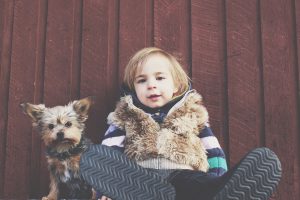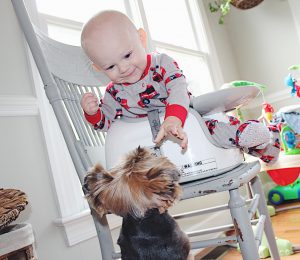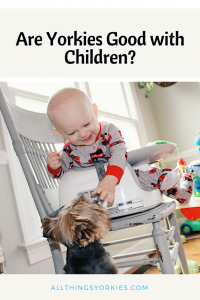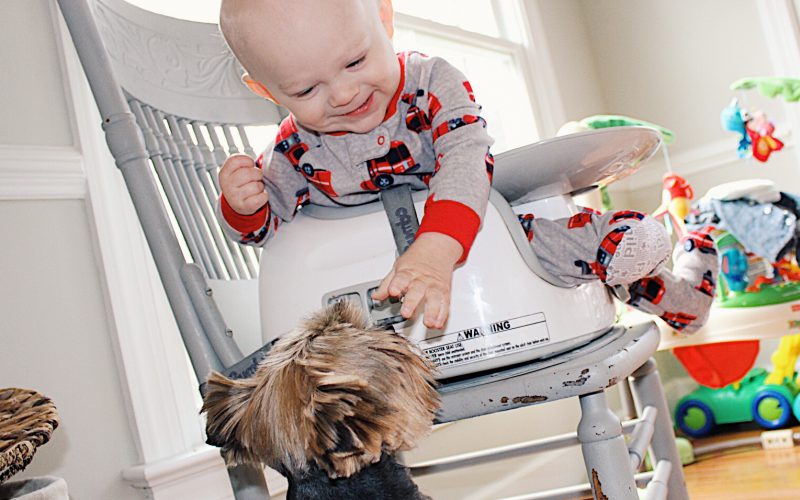Yorkshire Terriers are an incredible breed. They are highly intelligent, very energetic, playful, and cute to boot, but are they good with kids? Well, sometimes I think we are asking that question the wrong way… Instead of asking “are Yorkies good for kids?” I think we need to ask ourselves, “Will my kids be good with a Yorkie?”
Let’s look at the difficulties of owning a Yorkie while you have young kids, some characteristics of Yorkies, and how you can help your kids and your dog to function well together within the family unit.
Is it possible to have a Yorkie and small kids living happily together?
The short answer is… Definitely. In fact, I am living proof that it is possible.
But is it easy?
Unfortunately, no, not really.
Not all Yorkies are the same, and you could get lucky with a pup that absolutely adores kids, but it is highly unlikely with this breed. There are even some Yorkie breeders that will not sell their pups into a home that has small children present.
If you really want to have a Yorkshire Terrier and little kids living happily in the same household, you are going to have to lay down some ground rules right from the get go, take precautions to assure your dog’s safety and comfort, and teach your very young children the utmost respect for dogs from the very beginning.
A Few Yorkie Characteristics
There are several factors that play a role in why Yorkies get a bad reputation when it comes to their not so sweet behavior towards small children.
1. Yorkies are tough dogs, in an adorable tiny body.
What I mean by this is that they won’t put up with shenanigans.
They may look like they’re made out of cotton candy and rainbows, but this breed was bred to be tough. They were originally rat dogs, and were sometimes even used for hunting to chase angry animals out of their dens. They are not afraid to fight in dangerous situations.
If a Yorkie feels threatened, or is fearful of getting harmed, they will stand up for themselves, and the only way dogs can do that, is with their bark and their bite.
You can already see why this personality trait might not mix well with children. If kids are being too rowdy and rambunctious around the dog, they might feel the need to defend themselves. Leading to a snap or even a bite.
2. Yorkies are very small.
According the American Kennel Club breed standard, Yorkies are not to exceed 7lbs when they’re full-grown. Some are a little larger, but most are between 4 and 8lbs. This makes them extremely vulnerable when around very young children. Yorkies are definitely tough, but they are still fragile, and can very easily be injured by a child on accident.
3. They can become easily stressed.
This breed tends to be more sensitive to a lot of noise and commotion. They like to feel in control of their surroundings, and when they feel out of control, they become anxious. An anxious and fearful dog can become an aggressive dog if it is not getting proper downtime, stress-relief, and reassurance from their human caregiver.
Dog Warning Signs
Lets look at some warning signs that a dog may give you or your child if they are not comfortable with a situation they are in. Keep in mind that every dog is different and may not show all of these signs. Some dogs may only show one sign or warning before a bite occurs, other dogs will show all of them. It depends on the dog’s personality, tolerance level, and how uncomfortable the dog is in the specific situation.
It is important to know all the signs and catch them early on before things turn into a more serious problem.
1. Yawning, licking their lips, and avoiding eye contact. – This is saying, I feel threatened by you, and I am uncomfortable. If the dog cannot escape from the situation that is making them uncomfortable, this could quickly escalate to a bite.
2. Tail pointing up or out, may be stiff, or wagging in a stiff like manner, and ears perked. – A wagging tail means the dog has high energy, it does not necessarily mean that it is good or happy energy. If the dog’s body is still, but the tail is wagging, then he is probably not happy. A happy tail wag typically involves the entire body wagging along with it.
3. Excessively licking your child’s face. Most face licking is harmless, but pay attention to your dog’s body language while he or she is licking. Are they relaxed and at ease, or are they tense and acting anxious. Excessive licking can be a sign of anxiety in some dogs, and it can be an easy one to miss.
4. Body is stiff and tense. – The dog is preparing himself to fight.
5. Growling with eyes wide. – Growling is a sure sign that your dog is unhappy, and is about to take further action if you do not stand in and help, often times their eyes are wide, showing the white part of their eye, and the body is rigid.
6. Showing teeth and snapping. – This is the last step that a dog will take before a true nip or bite occurs. If you see your dog in this state, very quickly remove the dog (or child) from the situation to help him feel more comfortable.
7. Nip or Bite. – These signs can escalate very quickly, and if you do not catch them, a nip or bite can happen. A nip is a “soft bite” that does not draw blood. The dog is trying to say, I don’t want to bite you, but I really don’t like what you are doing to me. A bite occurs when a dog is so uncomfortable that they feel the need to protect themselves, from what they perceive, a dangerous situation.
*Note – If a dog moves right into a bite with no warnings, and goes after a child in “attack mode” without the child having done anything to provoke the dog, then this is an entirely different situation. This dog needs serious help, and may need to be re-homed for the safety of your child. This is a rare occurrence, but I have heard off it happening. Not in Yorkies specifically, but just some dogs in general that have a serious issue with kids for one reason or another.
Tips for keeping the peace.
Here are a few things that I have had to do in order to keep the peace in my home, and some ways that I have taught my kids how to respect our dog. (and all dogs for that matter)
Remain calm if your dog growls, or snaps at your child. This is the only way a dog knows how to protect themselves. I know how alarming it is the first time your dog snaps at your precious baby. You instantly feel protective over your child, and you forget that you need to also protect and watch out for your dog. There is a reason why the dog snapped in the first place. They felt insecure, scared, uncomfortable, or threatened, and it’s their nature to react this way. (The first time Willow snapped at my daughter was because she got ahold of Willow’s ear and yanked it before I had the chance to stop it from happening.)
If you instantly lose your temper, and scold your dog, or punish the dog, they will think they are being punished for attempting to warn the child or protect themselves. This can lead to worsened aggression. If the dog feels he is not allowed to warn the child, he may simply move right into a bite in the future.
Instead, if and when this happens, calmly and quietly remove your dog or your child from the situation, and be sure to pay closer attention to your dog’s warning signs in the future. You do not want to reward your dog for this behavior, but do not punish the dog for it either.
Prove to your Yorkie that you will protect him/her. This may mean periods of separation from your child when the dog is becoming stressed.
My Yorkie, Willow, was already a year and a half old when I had my first baby. Once my daughter was old enough to toddle around, I watched very carefully to make sure she was not making my dog feel uncomfortable. If she began to approach Willow, and Willow tensed up or tried to move away, I immediately read her signals, picked up my dog, told her she was a good girl, and placed her in her own gated area with her bed, food and water, and a treat to remind her that she was not in trouble.
This may sound un-kind to those who always want their dog to be around the family at every moment, but in all honesty, it helped my dog. It told her that I was in charge of the situation, and I was not going to allow her to get hurt. A dog will not feel the need to nip or bite if their owner is in control of the situation.
You can also remove the child from the situation, but I have found that toddlers are so curious and interested in the dog, that it can be difficult to get them to leave the dog alone for long. I do sometimes remove my kids instead though, to remind my dog that it doesn’t always have to be her that gets moved. Sometimes she gets to stay, and still feel comfortable in her home, because she is a member of our family too.
The point is to show your dog that you are in charge. Prove to them that you are a good pack leader, who is capable of protecting him/her, so that they don’t need to protect themselves with their bite.
Make time to play with your Yorkie and give him exercise. This may sound like a no brainer, but it can be hard to make this a priority with little humans running around. Dogs can have stress build up if there is no outlet to release it, just like people! An exercised dog is a happier, more laid back dog.
Allow your Yorkie to have special relax areas that the kids can’t get to. I let my Yorkie sleep on the back of the couch. Some people may not like their dog climbing on the couch, and that is ok, but try to find an area that your dog can go to relax where toddler hands cannot reach them. You can also invest in a baby gate like this one from Amazon, which has a pet door, so your pet is able to retreat to a safe zone when they are feeling stressed, and little feet will not be able to follow.
![]()
Teach your kids to respect your Yorkie and his or her space. From the time my daughter was old enough to crawl, I constantly told her to have gentle hands, I didn’t allow her to touch the dog unless I was guiding her hands, and it was only when I knew Willow was calm enough to accept it. I don’t allow my kids to take toys from her, climb into her bed, get too close to her when she is resting, or get anywhere near her food dish. This can seem exhausting, and like a constant task… and in some ways it is, but if you want to keep a Yorkie happy in your home with kids, then you will most likely need to practice these things and be on constant watch for your dog.

Even if you have a dog that is very tolerant of kids, it is still a good idea to teach your children these things so that they are respectful towards other dogs that may not have the same patience levels. Your dog may not mind rough-housing around, but other dogs may see it as a threat.
My three year old is very gentle with every dog she meets, and has learned to ask if the dog is friendly before she goes to pet them. We still have moments in our house when I need to tell her to calm down around the dog, or to move away from the dog’s face, but overall she and Willow get along fine now. My one year old on the other hand, is a bit rough, so I do not allow him to go near the dog unless I am guiding his hands to help him be gentle.
In most cases, Yorkies do prefer homes without kids.
If you dream of your kids growing up with a dog that simply adores them, that tolerates all of their craziness, and sleeps at the end of their bed, then I am sorry to say, a Yorkie is not the best choice for you.
Overall, Yorkshire Terriers do best in homes with older children or no children at all. If you have young children or plan on starting a family soon, my advice to you would be to hold off on getting a Yorkie until your youngest is at least 7 or 8, and can fully grasp and practice what it means to be gentle and respectful to a pet. Young kids can learn this, but you still have to give them constant reminders, and the noise level they produce can be overwhelming for a Yorkie. If you already have a Yorkshire Terrier and are planning to have children, do not despair. It may not always be easy to keep the peace in the home, but it surely can be done!
There are plenty of small breed dogs that are better known for their tolerance towards children. The Beagle, Pug, and Cavalier King Charles Spaniel for example, all tend to have better personalities for being around kiddos. That being said, I do understand if the desire of your heart is to own a Yorkie… because they are pretty amazing. 😉
So if you want to move forward with getting one while your kids are young, just be sure that you’re ready to take on the commitment of being a constant guardian for your pup. They deserve to feel comfortable in their home.


– Save this information for later, and help us spread the word by pinning this post to Pinterest!
Hover over or tap the photo to see the Pin it option.
Have a question or comment for me? Leave them in the comments below and I will get back to you shortly! 🙂
Related Posts:
- For further reading on Yorkshire Terrier Characteristics, and personality traits, check out this article!
- The History of the Yorkshire Terrier.
Popular Posts!
- Potty Train your Yorkie the EASY way!! This indoor potty system can be used as a permanent indoor potty, or just an easy way to train them and transition them to going outside later! This is how I trained my Yorkie and it worked like a CHARM. Plus, I share with you a discount code for this system within the post!! Woot!
- Best Food for Yorkies. Learn all about Yorkie nutritional needs, and some of our favorite food choices for your little pup!



Thanks for the information. Picking a dog breed that’s good around small children is definitely something worth considering when deciding to own a dog. Otherwise, the situation can be tense for both your child and your dog. I appreciate that you included the warning signs. We’ve taught our children to respect a dog’s space when it’s upset. I get agitated when my kids have friends over, and their parents haven’t done the same. I usually have to keep the dogs in our bedroom out of the way. And, honestly, I feel my dogs shouldn’t have to go to the bedroom because we have guests. It’s their house, too. So, I’ve been taking the opportunity to teach others about how to treat dogs. Again, thanks for the post.
Yes, I totally understand that! I always put my pup up in our room too when we have other small children visiting because I just don’t want to take the risk of her getting too stressed. It is surely an important thing to teach children respect for dogs.
I love Yorkies. They are just so darn cute! I have been actually thinking about getting one, have for a long time. These are great tips that I would have never thought of! I am going to bookmark this for future reference. Thanks!
You’re welcome! I am so glad you found it helpful. 🙂